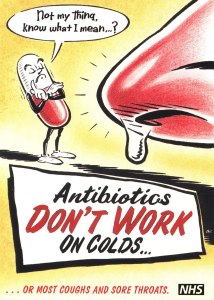Maryn McKenna spoke today at the National Library of Medicine on “Losing the Miracle? Agriculture, the FDA, and the Controversy over Farm Antibiotics.” Ms. McKenna was recently named recipient of the 2013 Byron H. Waksman Award for Excellence in the Public Communication of Life Sciences and finalist for a James Beard Foundation Award. Circulating Now interviewed her about her work.

Courtesy Scott Streble
Circulating Now: Tell us a little about yourself. Where are you from? What do you do? What is your typical workday like?
Maryn McKenna: I am a journalist and researcher working in print and online, chiefly addressing pubic health, global health and food policy. I am a weekly contributor to Wired and National Geographic. I write for a number of magazines, journals and sites in the US, Europe and Asia, including Slate, Nature, The Guardian and China Newsweek. I am the author of two award-winning books: Superbug (2010, Simon & Schuster) about antimicrobial resistance, and Beating Back the Devil (2004, S&S), a narrative history of the disease-detective corps of the Centers for Disease Control and Prevention, for which I was embedded with the corps for a year. I am also a senior fellow at the Schuster Institute for Investigative Journalism at Brandeis University and have just concluded a year as the inaugural “project fellow” in the Knight Science Journalism program at MIT; I remain a research affiliate at MIT.
Because I am a journalist, I spend a lot of time going places to talk to people and record my impressions of settings. In any week, that can be a poultry farm in south Georgia, a farmers’ market in London or a government agency in the Netherlands. In between trips, I am either in a library—usually the Hayden Library at MIT or the Goldfarb Library at Brandeis—or at my desk in Atlanta. I work under an array of souvenirs and reminders: a plush staph bacterium, an oil painting of a polio virus, a sketch of an Arctic graveyard where 1918 flu victims were buried, and my father’s ornate and lovely vaccination certificate, issued by New York City in 1929.

National Library of Medicine #101447531
CN: Can you tell us about the work you presented in your lecture, “Losing the Miracle? Agriculture, the FDA, and the Controversy over Farm Antibiotics.”
MM: This talk provided the audience an advance look at the work underlying my new book, which will be published by National Geographic in 2015. I am examining the history of the use of antibiotics in agriculture, which begins in the late 1940s—in the early days of antibiotic development—and to this day remains an important and unresolved public policy issue.
CN: How does history, and the history of medicine specifically, factor in to your research and writing?
MM: People think of journalists as covering only the immediate: What happened yesterday, last week, last year. In fact, all my books depend on my being able to make informed comparisons between the modern day, and events and findings from more than 50 years ago. In the case of this new book, the early history of antibiotic manufacture—the vision that developers had for how antibiotics would change the world, and the ways in which that vision was undermined—is an essential underpinning of the story.
CN: How have the collections and resources of the NLM informed your work?
MM: I am an independent journalist, and while I greatly benefit from relationships with academic institutions, those relationships are generally non-stipendiary and low-residency. So online access to historical resources is a crucial component of my work. Much of my new project depends on papers written in the early days of antibiotic development, which I have discovered through the incredibly rich resources of PubMed and PMC—such as, for instance, the 1949 paper in the Journal of Biological Chemistry “The multiple nature of the animal protect factor” (Stokstad, Jukes, Pierce et al.), which describes the first use of low-dose antibiotics on food animals.

CN: What inspires you in your work, and what do you hope readers will gain from it?
MM: A colleague once joked to me that I cover the “Oops” beat, in that all of my work as a journalist seems to examine unintended consequences. So much of my work, including this new book, addresses the accidental after-effects of bold, usually well-intentioned public policies. Antibiotics were incorporated into agriculture as part of the post-World War II impetus to feed the world: to decrease costs while improving yields within the complex economic realignments of post-war societies. The rapid rise in antibiotic resistance that resulted was for the most part unanticipated. Decades later, the tension between agricultural production and public health protection remains unresolved.
Maryn McKenna‘s presentation was part of our ongoing history of medicine lecture series, which promotes awareness and use of NLM and other historical collections for research, education, and public service in biomedicine, the social sciences, and the humanities.


Right here is the perfect site for everyone who hopes to understand this topic.
You realize so much its almost hard to argue with you (not that I personally would
want to…HaHa). You certainly put a new spin on a topic that has been discussed for many years.
Great stuff, just excellent!
Thanks to the NIH Record for covering Maryn McKenna’s lecture: http://nihrecord.nih.gov/newsletters/2014/08_01_2014/story1.htm
Maryn McKenna visited NLM a year ago to deliver this history of medicine lecture. She recently delivered a TED talk on the same subject, and if you are interested you can watch it here.
The interview really goes great! Its true that most of us believe that the media and journalist only cover the immediate moment, I don’t blame them for it, its what we want, and also we need independent contributors like Maryn McKenna to let us know about the history, thanks for sharing the conversions!